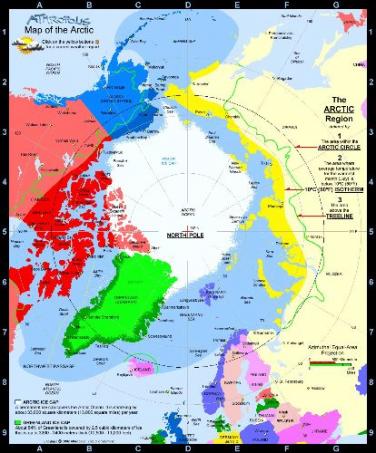Rick Krishfield and Andrey Proshutinsky work at the Woods Hole Institute of Oceanography, or WHOI (pronouced "hooey"). I will be joining them on the Beaufort Gyre Exploration Project on the ice-breaker CCGS Louis S. St-Laurent this summer. I am planning to visit Woods Hole in June, before the expedition. So that we can get to know each other, I interviewed Rick and Andrey via email.
An unusual view of the Beaufort Sea, and the Arctic.
**The BGE departs from Kugluktuk, NW Territories, Canada. (Courtesy Anthropolis-- http://www.athropolis.com/map2.htm) **

At WHOI, Rick has been involved with oceanographic research in the Polar oceans because of the importance of those regions for understanding and predicting the directions of global environmental change. As a result, he has developed special knowledge and skills to successfully manage scientific operations in extreme environments. He will have a lot to teach me and I look forward to sharing his special knowledge and extreme skills with you throughout the summer.
Rick got his job at WHOI by answering an ad! He was working in industry at the time and thought the new challenge would improve both his science and technical skills. In school Rick liked math and literature, a perhaps unlikely combination. Rick's literary talents are evident in the detailed, interesting and entertaining Arctic history that he and Andrey Proushutinsky wrote.
Currently, Rick is involved in several projects that measure ocean water properties. One is the expendable ice-tethered profiler (ITP) project. These devices measure changes in temperature and salinity in the upper layer of the ocean. What makes these ITPs especially useful is that, once they are installed, they sit on the ice and transmit the data back to the laboratory in near-real time. So the scientists can be at home, warm and with family, while the ITP is out in the extreme, collecting data.
The ITP is a great idea! But it can take years for this idea to turned into a device that can be put in the field so it can return data. Rick is involved in writing the proposal, organizing and preparing the field project and instrumentation, deploying equipment, recovering equipment, and downloading and processing data and THEN his team can see the results of their labors. It is exciting when you realize that sometimes you might be the first person in the world to see or recognize a peculiarity of the Earth.
Rick has spent 5 weeks of the past several summers on the Beaufort Sea. When he is in the field, he misses his family, friends, and barbequing! Rick is currently in the field deploying an ITP at the North Pole Environmental Observatory (NPEO).
Rick certainly leads a life full of adventure! His advice to students is to realize that very few oceanographers get rich by pursuing their research. Be extremely curious, persistent, and have a real appreciation for the complexity of the sea, and you will find rewards. Find the fascination in everything.
Andrey Proshutinsky wants to study nature and understand how, and why, it changes. He always liked geography, physics and math, and studied oceanography at the Arctic and Antarctic Research Institute in Russia. Many years ago, he developed a hypothesis to explain why a part of the ocean had so much fresh water in it. As the Principle Investigator and Chief Scientist of the Beaufort Gyre Exploration Project he oversees the various experiments that are run to collect the data necessary to test his hypothesis. He hopes that he can develop a model to explain how the Arctic climate works which will help us understand how climate works in general.
The most rewarding aspect of his work is to discover something that has not been recognized before by others, and to contribute this information to the scientific and broader communities. This summer I will be able to tell you about his work, and how understanding the Arctic climate will help us understand our own climate. Andrey especially likes being in the field; when he is not in the field, he misses it!
He encourages students of all ages to observe the environment, work hard in school and ask many questions. Value your time.
Look for more about the BGE team soon!
Gerty Ward says -- see you soon!

